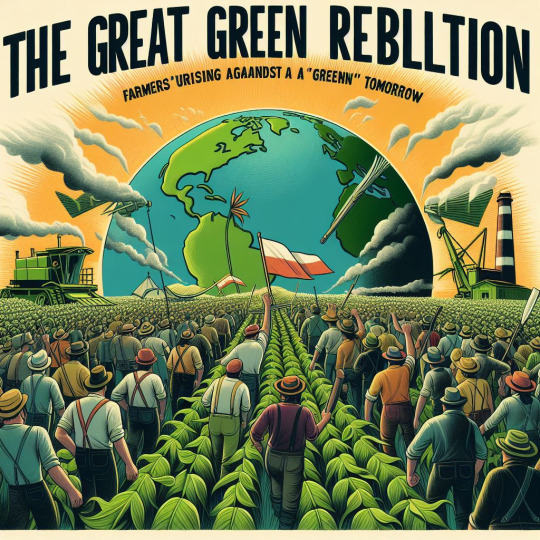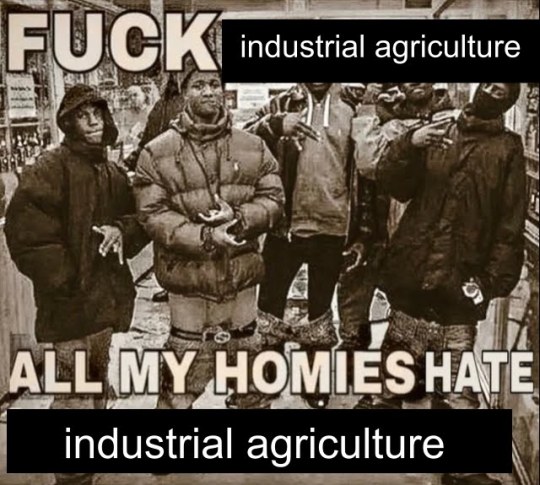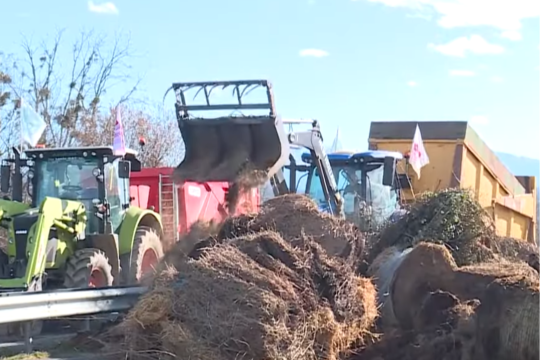#agricultural policy
Explore tagged Tumblr posts
Text
@argumate, in re ecological jianghu
Is prev looking for the Agricultural Science department? They're the ones who get their hands dirty on university-owned research farms looking for ways to e.g. breed chickens with better welfare without compromising meat output, and how to make mobile slaughter units cost-effective.
And they take people from farming backgrounds as well as science and policy.
5 notes
·
View notes
Text
The Great Green Rebellion: Farmers' Uprising Against the Quest for a 'Greener' Tomorrow
In a stunning turn of events that you might have missed (because let’s face it, it’s not on mainstream media, and who reads past the headlines these days?), farmers across Europe have decided they’ve had enough. No more Mr. Nice Farmer. From the picturesque fields of Germany to the romantic vineyards of France, the agricultural proletariat is rising against what they perceive as the tyrannical…

View On WordPress
#2024#Agricultural Policy#Agricultural Unrest#Agriculture Satire#Climate Change#Climate Policy#Dutch Farmers#Environmental Humor#Environmental Legislation#EU Parliament#European Farming#Farmers Protest#Farming Crisis#Farming Humor#France#Germany#Green Rebellion#irony#Manure Protest#Net Zero#Policy Satire#Political-Commentary#Rob Roos#Satire#Tractor Blockade#UN Agenda 2030
2 notes
·
View notes
Text
Evaluating the Efficacy of PM-Kisan Samman Nidhi in Transforming Indian Agriculture: A Critical Analysis
The Pradhan Mantri Kisan Samman Nidhi (PM-KISAN) scheme, launched in 2019, represents a significant effort by the Indian government to address the financial challenges faced by small and marginal farmers. By providing direct income support of ₹6,000 annually, the scheme aims to alleviate the economic burdens of farmers and stabilize the agrarian economy. However, its efficacy in transforming Indian agriculture remains debatable. Insightfultake evaluates the scope, financial adequacy, and impact of PM-KISAN, drawing comparisons with global agricultural support systems. It also highlights the persistent challenges in Indian agriculture and proposes a holistic approach to ensure sustainable growth. Using data from government reports, scholarly articles, and global case studies, this article argues that while PM-KISAN is a step in the right direction, its current structure and scale are insufficient to address the systemic issues plaguing Indian agriculture.
#PM-KISAN scheme#Indian agriculture#farmer income support#agricultural subsidies#rural economy#agricultural transformation#financial assistance for farmers#sustainable farming#agricultural policy#global agricultural systems
0 notes
Text
Farmers Rally Across the UK in Historic Protest Against Labour's Tax Policies
Today, the fields and roads of Britain witnessed an unprecedented scene as farmers from various regions converged in a coordinated protest, marking a pivotal moment in the ongoing debate over agricultural policies. This movement, spearheaded by the Farmers Union, isn’t just about financial burdens; it’s a statement on the survival of rural communities and the heritage of farming in the UK. The…
#agricultural policy#British politics#farmers union#farming industry#inheritance tax#Labour seats#political protest#rural communities#tax protest#UK protest
0 notes
Text
Donald 2.0: Trump's Farming Policies
Donald Trump became US president for the second time on January 20th. The 47th President will likely change the direction of many US farm policies.
Donald Trump became US president for the second time on January 20th. The 47th President will likely change the direction of many US farm policies. This will provide opportunities for and threats to farmers in the US and elsewhere. What will Trump’s farming policies be given a radical shift away from the Biden years? What do US farmers think, and what will the consequences be for the global…
1 note
·
View note
Text
Civil Society Calls for the National Government to Enforce a Ban on Hazardous Agri-inputs
Civil society groups at the First National Agroecology Symposium call for a ban on harmful agricultural inputs in Kenya, urging the government to prioritize safe, nutritious food for all. At the agroecology symposium in Nairobi, civil society organizations advocate for a ban on unsafe farm chemicals, emphasizing the need for government action to protect public health and promote sustainable…
#agricultural policy#agroecological practices#agroecology symposium#banned chemicals#biodiversity conservation#civil society#Climate resilience#fake fertilizers#food safety#Food security#glyphosate ban#harmful agricultural inputs#kenya#National Agroecology Policy#nutritious food#PELUM Kenya#seed sovereignty#sustainable agriculture#sustainable farming
0 notes
Text
Speech Governor Walz Gave in Louisville, KY!


~BR~
#kamala harris#tim walz#harris walz 2024 campaigning#policy#2024 presidential election#legislation#united states#hq#politics#democracy#kentucky#louisville#andy beshear#Justin Jones#al gore#campaign rally#workers rights#agriculture#american jobs
4 notes
·
View notes
Text
Me when doing my environmental science homework, at every available opportunity:

#wish there were a class discord or a chill teacher so i could share it#fr though I'm like “oh we're talking about freshwater? hey did you know that agricultural runoff is causing accelerated eutrophication?”#and that a lot of the runoff is bc of erosion caused by the destruction of ecosystems and their vegetation that would've kept soil in place#and the runoff is mostly compromised of fertilizer and bacteria and pesticides from the agriculture and sediment from the eroded land#and that crop irrigation is so inefficient that literally 40% of irrigation water never reaches the crops#and don't even get me started on the FUCKING CORN SUBSIDIES#god those fucking corn subsidies#“hey boudicca what's the worst policy choice the us government made in the 1930s–40s?”#“was it American isolationism? maybe increased militarization? the garbage treatment of women and minorities?”#wrong! it was not stopping those fucking corn subsidies#(this is a joke obviously those other things were worse)#(I'm not actually saying this silly little agricultural practice was worse than Japanese internment don't worry)#but i AM saying that at some point they should've fucking phased out those goddamn corn subsidies#do you wanna know why California grows so much corn even though it's an incredibly water intensive crop and California is dry as shit?#I'll give you three guesses#anyway sorry for rambling my point is fuck industrial agriculture#agriculture#described
9 notes
·
View notes
Text
Government of Brazil and FAO sign alliance to support vulnerable populations in urban and peri-urban areas of Latin America and the Caribbean
The project in the framework of the Brazil-FAO International Cooperation Program aims to enhance food security and reduce poverty in the region.

The Food and Agriculture Organization of the United Nations (FAO), the Brazilian Cooperation Agency of the Ministry of Foreign Affairs (ABC/MRE), and Brazil’s Ministry of Social Development, Family and Fight Against Hunger (MDS) signed the project Strengthening the regional agenda of food systems for the urban-rural continuum in Latin America and the Caribbean.
Data from the Economic Commission for Latin America and the Caribbean (ECLAC) indicates that 81% of the region’s population lives in urban areas, posing challenges for access to healthy food and the inclusion of family farmers in value chains. Therefore, this project seeks to enhance food security and reduce poverty among the most vulnerable populations in urban and peri-urban areas of cities in Latin America and the Caribbean. It also aims to promote urban food systems that are more efficient, inclusive, sustainable, and resilient.
Continue reading.
#brazil#brazilian politics#politics#economy#foreign policy#international politics#Food and Agriculture Organization#united nations#image description in alt#mod nise da silveira
2 notes
·
View notes
Text
#farmers#excessive bureaucracy#european union#poland#france#germany#CAP#the Common Agricultural Policy#netherlands#romania
5 notes
·
View notes
Text
So grateful for my earth systems science class this semester I just did not know how to read or think about climate I was so pedagogically impoverished
#we all are! a field where the top climate scientists are too afraid to talk about agricultural processes that feed into air pollution#because its not intuitive and 'big truck make smoke come out of exhaust' is#that whole UN / international climate policy machinery thinks people are sooo fucking stupid . and this belief is actively like#diluting the info of public interest we receive and the policies we are sold
7 notes
·
View notes
Text
Legalizing Minimum Support Price (MSP) in India: A Multifaceted Analysis
## IntroductionThe debate around the legalization of Minimum Support Price (MSP) and its implications on Indian agriculture has gained unprecedented momentum in recent years. This discourse is set against the backdrop of global pressures, including World Trade Organization (WTO) scrutiny, domestic agricultural challenges, and the socio-economic fabric of rural India. The conversation encompasses…
youtube
View On WordPress
#2024#agricultural crisis#agricultural income#Agricultural Policy#agriculture#corporate interests#economic advisory#economic growth#economy#farmer protests#farmers&039; welfare#farming#food security#India#legal framework#market efficiency#market regulation#minimum support price#MSP#Policy#rural development#rural wages#subsidies#sustainability#Swaminathan Commission#trade disputes#WTO#Youtube
0 notes
Link
What was needed, then, was not merely land redistribution but also economic independence, such that farmers could actively engage and defend a democracy that reflected the range of their interests. To avoid authoritarian control, new states would need to create opportunity rapidly, and this required economic planning—especially the coordination of prices and markets and programs to teach peasants about technology. Warriner and Yates recommended a system of cooperatives and shared technology supporting small, economically independent farmers who could then make up their own minds about politics. Such plans would provide new states with comprehensive economic programs for both cities and towns, ensuring the “economic conditions under which the peasants can greatly increase their outputs,” and that both urban and rural workers could look for “a steadily rising level of incomes.”
Warriner and Yates theorized that planned economies were most vital for rural workers due to the nature of the agricultural cycle. Peasants, they argued, were economically vulnerable in an industrial economy where workers with wage increases were likely to spend more of their money on manufactured goods than on food. Modern states could cushion peasants from the inherent vulnerability of agricultural enterprise, which, unlike manufacturing, couldn’t be planned several months or even years in advance and couldn’t be easily scaled to adjust to new information from the market.
State programs could ameliorate human misery, they argued, and governments should adopt measures to protect agricultural workers; such sound engagements, they reasoned, could inoculate peasants against the political promises offered by would-be despots. They wrote: “Man is beginning to realize that he can exercise control. . . . Peasants in their economic lives are still at the mercy of the rest of the community which exploits them, but this state of affairs need not continue for ever.” Coordinated expenditure and management by a centralized bureaucratic state could enable a new economy—one marked by “economic conditions under which the peasants can greatly increase their output,” even supplying a “steadily rising level of incomes.”
Economic planning thus lay at the root of a general revolution to increase prosperity and economic security while ensuring a path to democracy in which peasants would not be easily wooed by authoritarian forces. According to Warriner and Yates, by setting farmers up with individual plots of soil, land redistribution would be a key element of economic planning in most nations. In a later book published in 1955, Warriner laid out a plan premised on recent UN reports that, in her words, “put forward the contention that land reform . . . must be regarded as a condition of economic development.” Soon after describing these schemes in print, Warriner and Yates would each have opportunities to realize them. While Warriner went on to advise a variety of postcolonial nations, Yates would help to found the FAO, working alongside John Boyd Orr, another veteran of the British crusade against hunger.
Unlike Yates the activist, Orr was a professor turned adviser to the state. Experiments published by Orr in 1927 proved that Scottish schoolchildren given milk grew stronger than their peers. He was the veteran of a campaign to remedy the condition of Britain’s working classes by providing cheap access to food. His 1936 report, Food, Health, and Income, argued for an increased role by the state in the nutrition of the poor. In the decade that followed, Europe was wracked by food shortages, and Orr’s work offered a model for European policy.
In 1945, Orr appeared in Quebec at the FAO conference as an unofficial adviser. Despite having been excluded from the official British delegation, Orr electrified the conference with a sermon in which he condemned political inaction about nutrition in vivid terms. “The people wanted bread,” said Orr, “but were given statistics.” The next year, Orr was selected as the FAO’s first director general.
Orr, like Yates and Warriner, believed that state planning could level human disparities. Orr had already spent a decade publishing books that envisioned a top-down food board for Britain that would collect information on where food was grown and where it could be sold and then advise farmers about what to grow. At the FAO, Orr would style the same dreams on a global scale. Orr’s agenda was threefold: establishing the FAO as an independent, policymaking institution capable of recommending global strategies; combating the worst consequences of poverty by supporting a worldwide food program (a “World Food Plan”); and challenging the long-term consequences of racism in Europe’s former colonies.
Orr’s view of how a coordinating institution could support society was, if anything, even grander than that of Warriner and Yates. He wished to level the short divide not merely between rich and poor or rural and urban, but also between different races and different experiences of empire.
#history#food#land#Food and Agriculture Organization#farming#planned farming economics please tell me more#I dream of canteens and a rational food distribution policy
25 notes
·
View notes
Text
this election feels so hollow even though it’s likely ostensibly gonna be a good outcome. labour really just sucks fucking ass rn huh
#if the tories lose bad enough to make lib dems the opposition though… a guy can hope#I think it’s the fact that this is the first general election I can vote in that’s making me lose my mind a little here#I have done basically nothing but read today. I DO know a whole bunch more abt voting systems and the nightmare the tories have been now tho#I’m just kinda like. okay so what happens next? bc labour WILL do some decent shit but they also. fucking suck.#planning to look into the local green party once I’m back at uni bc I could actually do stuff there#I think I’m just dealing with a little bit of whiplash going from doing a biology degree where Everything is about climate change#like unambiguously it gets brought up in every topic (I DO focus on ecology and agricultural stuff and not like genetics but still)#clear consensus from literally everyone you talk to that shit has to happen right the fuck now.#it’s not even like I’m unaware of the state of policy rn I KNOW it’s a nightmare to do anything but we at least TALK about it#and then this election where it’s barely a footnote. biggest thing is the sewage dumping everyone’s talking about and yeah fucking finally#but is that all you’ve got?? the labour manifesto is bleak. it has a section and the stuff they’re proposing isn’t bad but it’s so little#and yeah no they’ve changed the official line on the manifesto to ‘make Britain a clean energy superpower’#I SWEAR it was different a few days ago#maybe I’m being pessimistic bc their plans for clean energy if they actually do them could be huge especially if they manage it by 2030.#it’s just that I know what the targets are and they’re already pulling back on shit like EVs bc of the shift right and I am So Tired#two party politics is a curse. as much as reform is an actual nightmare them getting a decent vote share might actually be the thing that#gets people talking abt proportional representation again bc they are nothing if not good at being loud#did you know we had a fucking referendum in 2011 bc what the fuck. and it went SO BADLY even though people generally supported it#god idk I think I’m once again being naively optimistic about people and election coverage has been very good at knocking me down a bit#people generally are good. I have to believe this. but man the british public is making that really fucking hard#genuinely I think a good chunk of that is down to first past the post driving politics to be divisive and aggressive#like is it the only problem? fuck no. but it’s definitely poisoning the way this shit goes bc when all the parties do is jab at each other#what are we actually doing here#idk I’m gonna stop now but this is taking up a ridiculous amount of bandwidth rn I can’t wait for it to be over#already dreading what the next election could look like in 4 years if starmer continues to suck ass bc I don’t trust him to not like at all#luke.txt#I said i was done but I just looked at the lib dem manifesto and oh my god it’s actually pretty good on this? holy fucking shit
4 notes
·
View notes
Text
Agriculteurs : la révolte s’étend en Occitanie et Macron a raison d’avoir peur
La déliquescence de notre société est résumée dans la condition tragique de nos agriculteurs et de nos policiers, abandonnés de tous. Par Frédéric Sirgant Soutenez notre travail, abonnez-vous à Semaine du MENSONGE au tarif préférentiel de : 1,50 € par mois pendant un an,envoi chaque lundi par mailPaiement sécurisé en cliquant ICI Agriculteurs : la révolte s’étend en Occitanie et Macron a…

View On WordPress
#agriculteurs#agriculture#boulevard voltaire#Frédéric Sirgant#Macron#Observatoire du MENSONGE#policiers#politique
3 notes
·
View notes
Text
Empowering Youth in Agriculture: How Digital Agripreneurs Are Revolutionizing Extension Services in Kenya
Discover how Kenya’s new agripreneurs model is empowering youth to provide digital extension services to farmers, revolutionizing agricultural productivity and market access. Learn how the Ministry of Agriculture is leveraging technology and digital platforms to enhance agricultural extension services, bridging the gap between research and farmers. Explore how digital agripreneurs are…
#agri-food systems#agricultural extension symposium#agricultural market access#agricultural policy#agricultural productivity#Agricultural technology#agripreneur model#climate change mitigation#cooperative societies in farming#digital agriculture#digital platforms for farmers#extension services#Farmer Support#farming innovation#KeFAAS#Kenya Agriculture#KIAMIS#Ministry of Agriculture Kenya#public-private dialogues in farming#YOUTH IN FARMING
0 notes